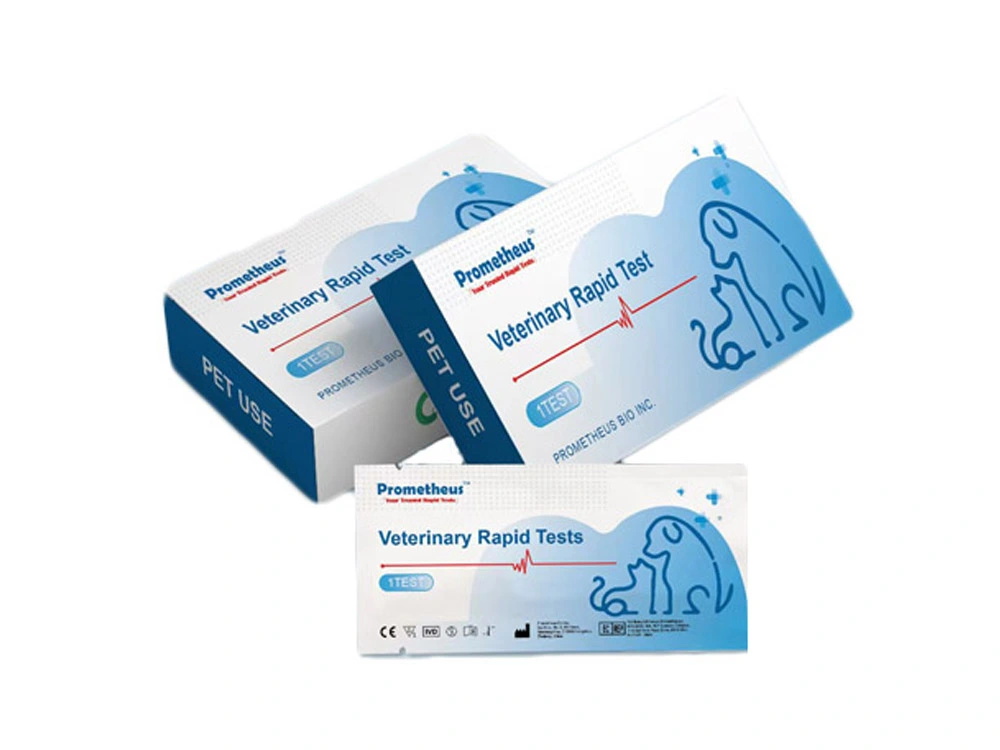Canine Parvovirus Antigen (CPV Ag)Test Kit

Description du produit
The Canine Parvovirus Antigen (CPV Ag) test is a diagnostic test used to detect the presence of CPV antigen in a dog's feces or vomit, usually done using a rapid immunochromatographic assay. A small sample of the dog's feces or vomit is collected and mixed with a solution on a test strip. The canine parvovirus test kit contains specific antibodies that will bind to the CPV antigen if it is present in the sample. This binding reaction produces a visible line or color change on the test strip, indicating a positive result for CPV infection.
Features of Canine Parvovirus Rapid Test Kit
Rapid results in minutes.
High sensitivity and specificity.
User-friendly and easy to use.
Non-invasive, requiring a small fecal sample.
Point-of-care testing for immediate diagnosis.
Early detection before visible clinical signs appear.
Cost-effective for routine screening.
Reliable evaluation for treatment decisions.
Portable for use in different settings.
Helps control the spread of parvovirus.
FAQs Of Canine Parvovirus Antigen (CPV Ag) Test
Q.
What is Canine Parvovirus (CPV)?
A.
Canine Parvovirus (CPV) is a highly contagious viral infection that affects dogs. It primarily attacks the gastrointestinal tract, leading to symptoms such as severe diarrhea, vomiting, loss of appetite, and dehydration. CPV can be life-threatening, especially in young puppies or dogs with weak immune systems.
Q.
What is a rapid parvo test?
A.
A rapid parvo test is a diagnostic test used to detect the presence of Canine Parvovirus antigen in a dog's feces or vomit. The test helps veterinarians diagnose CPV infection quickly and accurately.
Q.
How is the CPV Ag test performed?
A.
The CPV Ag test is usually done using a rapid immunochromatographic assay, similar to a pregnancy test for humans. A small sample of the dog's feces or vomit is combined with a test strip that contains antibodies specific to CPV. If the sample contains CPV antigen, it will bind to the antibodies on the test strip, producing a visible line or color change.
Q.
When should a CPV Ag test be performed?
A.
CPV Ag test is typically recommended if a dog shows clinical signs consistent with CPV infection, such as severe diarrhea, vomiting, and loss of appetite. It is important to conduct the test early, as prompt diagnosis can lead to timely treatment and better chances of recovery.
Q.
How accurate is the CPV Ag test?
A.
The CPV Ag test has shown to be highly accurate in detecting CPV infection. However, it is crucial to follow the instructions provided by the test manufacturer and interpret the results correctly. False-negative or false-positive results may occur if the test is not performed or read correctly.
Q.
Can the CPV Ag test be performed at home?
A.
Some CPV Ag test kits are designed for at-home use, allowing dog owners to collect samples and conduct the test themselves. However, it is always recommended to consult with a veterinarian for proper guidance and interpretation of the results.
Q.
Is vaccination against CPV necessary if a dog tests negative?
A.
Even if a dog tests negative for CPV, vaccination against the virus is still essential. Vaccination helps strengthen the dog's immune system and provides protection against CPV and other diseases. Consult with a veterinarian to determine the appropriate vaccination schedule for your dog.
Q.
Can other factors affect the CPV Ag test results?
A.
Certain medications, dietary factors, or recent vaccination may influence the accuracy of the CPV Ag test. It is important to provide the veterinarian with complete and accurate information about the dog's medical history and current medications to ensure reliable test results.
There are many point of care testing manufacturers, but we are one of the best choices for you.

